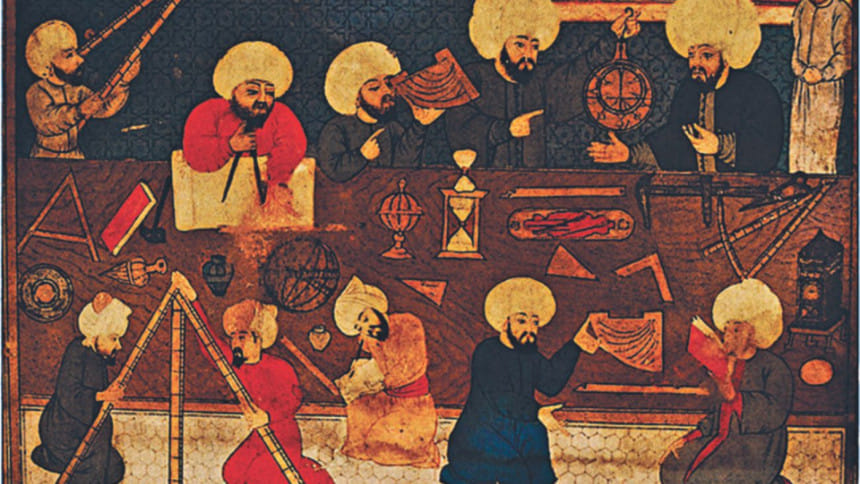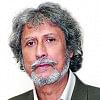Reviving the Age of Wisdom

The obsession with a section of youths of the country about "dying" for Islam gives rise to the paradoxical question: How can one serve Islam better? By being dead or by being alive and leading a productive life? We fail to comprehend what good can a dead Muslim do to Islam? On the other hand, those who live and work can surely serve Islam better. How? By completing education, working hard in research laboratories to discover ways to preserve food better, or discover vaccines for childhood diseases or effective medicine to cure diabetes and cancer and so on. Surely, such Muslims would do great service to Islam if they remain alive and work hard to discover technology to control floods that destroy households of the rural people every year. They would be remembered with great veneration by all for centuries if they would find better ways to fight pestilence and methods to increase crop production.
And this is exactly why we remember even today names of great scientists, scholars, mathematicians and physicians from the "Golden Age of Islam" from the 8th century to the 12th century.
The Islamic Golden Age refers to a period in the history of Islam traditionally dated from the 8th century to the 12th century, during which much of the Islamic world was ruled by various caliphates. This period is traditionally understood to have begun during the reign of the Abbasid Caliph Harun al-Rashid (786 to 809) with the inauguration of the House of Wisdom in Baghdad, where scholars from various parts of the world with different cultural backgrounds were mandated to gather and translate classical knowledge from around the world into the Arabic language. With the collapse of the Abbasid caliphate after Mongol invasions and the Sack of Baghdad in 1258 AD, the Islamic Golden Age is said to have met its end, while a few contemporary scholars place the conclusion of the Islamic Golden Age as late as the end of the 15th or16th centuries.
It should be noted that the Muslims of this age where motivated in their pursuit of knowledge and the development of science by various injunctions in the Quran and Hadiths which place great value on education, stressing the importance of acquiring knowledge. Thus, during this period, Muslims showed a strong interest in assimilating scientific knowledge of the civilizations that had been conquered. Many classic works of antiquity that might otherwise have been lost were translated from Greek, Roman, Persian, Indian, Chinese, Egyptian, and Phoenician to Arabic and Persian, and later translated to Turkish, Hebrew, and Latin.
This was possible as the Muslim governments of the time heavily supported and patronised scholars. Interestingly, the money spent of the Translation Movement for some translations is reported to be "equivalent to about twice the annual research budget of the United Kingodom's Medical Research Council" (http://www.bbc.co.uk/programmes). Moreover, Caliph Harun-al Rashid and his son al-Ma'mun established the House of Wisdom, which consisted of a library, translation centre and academy, in the Abbasid-era Baghdad.
Eventually, with the introduction of paper and a new, more convenient system of writing, it was possible to 'democratise' information. For the first time in history, making a living from simply writing and selling books became a reality. When the use of paper spread from China to Muslim regions in the 8th century, arriving in Al-Andalus on the Iberian Peninsula, present-day Spain in the 10th century," it became easier for Muslim scholars to keep a record of their discoveries and inventions.
History tells us that names of Muḥammad ibn Mūsā al-Khwārizmī, Ibn Muʿādh al-Jayyānī, Ibn Al-Haytham (Alhazen), Ibn Sina or Avicenna, Al- Rhazes, Abd al-Rahman al-Sufi, Al-Kindi, Ibn Khaldun and dozens others will shine like bright stars in the firmament among the ancient wise.
The young, countless Muslims of today should know that the Guinness World Records recognises the University of Al Karaouine, founded in 859 AD, as the world's oldest degree-granting university. The Al-Azhar University was the first university in the East, and perhaps the oldest in history.
That was a short glimpse of the Islamic Golden Age. It may be said with a great deal of conviction that if instead of devoting their life to acquiring scientific knowledge al-Khwārizmī, al-Kindi or Ibne Sina had taken up arms to wage jihad against the "infidels" and gotten killed in the process, there would have been no such thing as the Islamic Golden Age. They did all those great things by being alive and through hard work. They were also true Muslims.
We have to enrich our knowledge by reading the fascinating books on their works and achievements, and carry on from where they had left. Muslims have to wage jihad against ignorance and superstitions, and seek scientific knowledge that can be applied to human welfare. It is only by serving mankind that one can be a better human being and thereby a good Muslim.
The writer is Special Supplements Editor, The Daily Star.

 For all latest news, follow The Daily Star's Google News channel.
For all latest news, follow The Daily Star's Google News channel. 



Comments